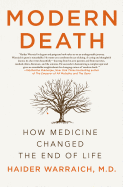
In Modern Death: How Medicine Changed the End of Life, Haider Warraich explores how human death has evolved over the course of history and offers recommendations for its future. A medical doctor, Warraich supplements his research with anecdotes from his personal experience, and draws on literature, theology, statistics and legal theory as well as the hard sciences. The resulting expert opinion is heartfelt, convincing and well informed.
Warraich begins with the mechanics of how cells die and the opportunities for analogy they offer: cells choose to die to promote the good of the organism; not dying on time is as bad as dying too soon. He recounts the medical advances that have increased human life spans astronomically in the last two centuries. In what comes to feel like the heart of Modern Death, Warraich then studies the nuances of euthanasia, assisted suicides and the withdrawal of life-support systems, and their legal histories in the United States and worldwide. He finds that these three categories of death are far less distinct than generally believed. Finally, he advocates strongly for patients' control over their own ends of life and exhorts his readers--patients and physicians alike--to discuss death openly.
For anyone interested in its thesis--that death is an important part of life, and medicine and society could do a better job of delivering this experience--Modern Death is a sincere and thorough examination of an often overlooked subject. Well served by Warraich's professional expertise and earnest emphasis, this is an indispensable contribution to the conversation about death. --Julia Jenkins, librarian and blogger at pagesofjulia

